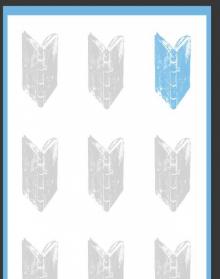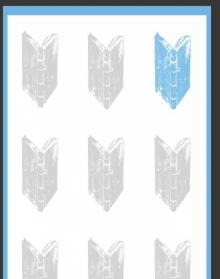- Home
- Storm Jameson
Company Parade Page 2
Company Parade Read online
Page 2
Without thinking she knew that she would not go back. She was too dissatisfied, possessed by a devil of energy and ambition. At the least notion of giving up it sprang in her; she could not go back to Yorkshire, to become nothing, unknown. She had to have something to show.
I should have no money, she thought, her mind turning from Richard to Richard’s father. It was a fortnight since Penn had written to her. She was not anxious and she did not mind seriously, but she wished he would resolve to leave the Air Force as quickly as possible and find work. His carelessness angered her. If he had work, between them they could contrive to live decently and have Richard with them. That’s not a great deal to ask of him, she thought, with growing anger.
Her mind turned back on itself and brought a much younger Penn to sit opposite a young ungrieving Hervey. At once she felt that though he had disappointed her since then, in a multitude of ways failed and outraged her, she was still bound to him. The nerve holding them to each other was alive when she touched it. If she looked up and saw him this moment crossing the crowded room to her she would feel the familiar lift and shock of her blood. I shall never be free of him, she thought: unless he left me himself, because he was tired of me, and then I should be free.
I don’t want to live like this, she thought, with surprise and fear. She looked for the first time at the people round her. The sharp light, warmth, and music, washed over them, accepted by them without interest or wonder. They drifted into the room, clung for a time to one of the tables, and drifted away, into streets and rooms she could not imagine, more than a million of them, squatting and pressing on the earth, pressing out grass and trees, killing the roots of many living things, so that these rootless creatures could exist. She thought, I left the place where my own people lived hundreds of years to come here. I was mad.
Almost at once she saw the waitress looking at her and knew she had stayed too long. There was a soldier in leather-cuffed khaki seated at the next table. He was drinking coffee and his eyes over the edge of the cup had a puzzled stare. He seemed not to know any better than she did what he was about. Behind his eyes were roads leading to trenches and the sights and sounds of that life, and he could not relate it to this nor this to anything waiting for him in the future. He stared, his worn uniform investing him with a quality of innocence and awkwardness. He was young, as young as Hervey. He felt her watching him, and his eyes examined her for a moment calmly. Hurriedly getting up, she walked past him and out.
In her room she took up the manuscript of her second novel, but she was too tired and too restless to write. Deliberately she began to think of the American with whom during the War she had had the misfortune to fall in love. She thought of it as a misfortune. She was still in love with him; still, though she did not then know it, imitating his ways of thinking and acting; and still resolute not to give in to him. She would never give in to him, knowing with something firmer and deeper in her than her senses, that he was not safe. What she meant by safe was precisely what it had meant to any woman of her family, at any time during the last five centuries. When she was vexed and restless, as now, she would think of him, and then it was as though he came into the room, with that light springing step, and smiling. To imagine him there gave her an exquisite pleasure and happiness. She would never have it in reality, since when he was with her she had to keep her mind sharp and steady against him. This was an instinct for which she never tried to account. It was part of her early discipline and beyond that a dry obstinate pride of blood, something that had been given her and which she could not give back.
She undressed and began to brush her hair. It fell almost to the arm of her chair, fawn-coloured and very fine. I shall cut it off, she thought. As soon as she was in bed she remembered Richard’s trick of taking the pins out of it while she pretended not to know what he was doing. She had to pretend to be asleep. He was trying not to laugh out while his hands felt along the plaits, warm and clumsy. When at last the plaits slipped and fell down she opened her eyes and jumped up. His face and wide brilliant eyes were alive with laughter. It broke from them, spilling over his round body.
She turned on her face in bed. I won’t think about it. I’ll go to sleep now, he’s sleeping he can’t count the days since I went he won’t remember anything oh my little little love.
2. Renn
David Renn left the advertising office at seven o’clock, an hour later than his young assistant. He was thinking of her as he prepared to go, and retrieved from the floor a sheet of paper on which she had been writing phrases about soap. They were all quite useless. He smiled a little, tore the paper across, and forgot her as he walked downstairs.
The street was empty except for a dray waiting outside a fruiterer’s, horse and driver frozen into the same attitude of passive endurance. As he crossed the street Renn imagined that the man had been one of his drivers in France but coming closer he saw that it was only the pose had deceived him. He walked on, quickly, wondering whether to go home or to try to find company for the evening. In the end he stepped into a post office and telephoned to his friend Earlham. Earlham’s wife answered for him and in half an hour Renn was opening the door of their shabby flat in the Euston Road.
Rachel Earlham was a very small shy Jewess, of nineteen, dark-eyed, with a delightfully gentle manner, like a well-brought-up child. She and her husband were Socialists, very poor, very ardent. Louis Earlham intended to stand as Labour candidate for a North London division. In the meantime he earned a very little money as a journalist. They lived like young birds on what they picked up. There were sandwiches on the table and two bottles of beer, but Renn had brought his own meal. He ate one of the sandwiches, to please Rachel.
There were only two chairs in the room, the table, and their bed, made to look like a couch. It was little wider than a couch and if they had not been so young and thin one of them would certainly have fallen out when the other moved. The second room of the flat was Earlham’s ‘study.’ With a visible effort it contained his desk, a chair, and their bicycles.
Earlham began to talk about his newspaper, which was Radical, independent, and very popular, through its habit of uncovering scandals in public life. It ran these until the excitement waned or the interests which had been attacked bought themselves off. He was violently angry—because he had been sent down to investigate charges of sweating in a bicycle factory, and it was far, far crueller than he had expected : he wrote the article, and at the last minute it was thrown out. The firm booked a series of full-page advertisements.
‘I know,’ Renn said. ‘I have to lay out the pages. They are our clients.’
‘Then,’ his friend shouted, ‘you can write about a skinny child of fifteen who is compelled to jump like a cat between two machines, covered with dust through which her sweat pours.’
Renn smiled his polite gentle impersonal smile. ‘On the contrary. I shall describe ideal bicycles made in an ideal factory.’
‘You are very wicked,’ Rachel said, blushing.
Renn looked at her with a mixture of affection and irony. ‘You two babies,’ he said, ‘imagine that when your Party comes into power there will be no more skinny overworked children. What nonsense! The system demands them.’
‘We shall alter the system.’
‘Peacefully?’
‘Of course.’
Renn laughed. He was peeling an apple. He cut the peel off carefully, not to break it, and draped the glossy coils round the neck of Rachel’s cat Habbakuk. Offended by their laughter Habbakuk fled through the window on to the roof of the next house. Beyond him a Sahara of roofs gleamed in the moonlight. He sprang feeling his whole body stretch and quiver, and disappeared in the shadows.
Rachel turned from the window to scold Renn, but his smile made her confused. She smiled shyly and happily and went away to make tea. Her husband’s voice, raised and vehement, filled the room and sent a shiver of excitement through her small body. She thought of the tiny mole on his arm, of the way he held his cup
and drank, looking at her, and of sleeping beside him in the thin creaking bed. Her heart beat quickly in happiness. When she carried the tea into the room Renn was leaning back in his chair with an air of contentment.
‘I know what is wrong with you,’ Rachel said,‘why you are always so superior and laughing at us. You ought to be married.’
‘Who would marry me?’ Renn answered. ‘I am bad-tempered when my leg hurts—and besides—I do not believe in committing oneself. If I could find a woman who did not feel that she had the right to turn my mind upside down to look for a safety pin, I might be able to live with her. Women are unbearably possessive.’ His voice was so kind that Rachel did not feel hurt. But she felt glad that Louis had other views on love.
Renn walked home through nearly empty streets. He was very tired and his mind plagued him with visions of his friend and Rachel absorbed in each other, in their shabby room, to the exclusion of everyone and everything else. Habbakuk and I are both in the cold, he thought, amused : I shouldn’t get very far over the roofs with this leg.
His landlady had turned the gas off on the stairs and he had no matches. He groped his way up to the second floor, opened his door and felt round for the box he remembered leaving on the cupboard. At last he found it. There was a letter and parcel on the table, both from his mother. He opened the letter first.
‘My darling boy, I am sending you a small cake and some apples from the second tree. They are wrinkled but sweet. I am sure you do not eat enough. Sometimes I wish you would give up trying so hard to make your way and come home. Surely there is something you could do here, in Hitchin? I miss you very much. It is as if you were away at school again but then there was always the holidays to look forward to. However you know best what is best for you, my dear boy. And perhaps you are in love? Your aff’t mother Kathy Renn.’
He undid the parcel and put the cake and the apples away in his cupboard. Then he undressed quickly and glanced for a moment at the sunken scars on his leg. For the hundredth time they made him think of a railway junction, the lines crossing and meeting on the inside of his leg from knee to groin. He lay down, closing his eyes, and saw the yard of his mother’s house, with the second apple tree in the corner. Half smiling, he fell a little and then deeply asleep.
Habbakuk poured himself round a chimney stack and moved arrogantly along a narrow coping. His eyes gleamed with the pleasure of heights and loneliness.
3. Delia
Delia crossed Piccadilly Circus with the insolence of use. The cold stung her face but her body in its fur coat felt warm and easy. Once across, she halted to look up at the clock before turning into the Monico for her meal. Seven. The room was half empty. She sat forward, balancing herself on broad white thighs, all that sagging and still vigorous flesh held and moulded into shape by her clothes. Once she had been so thin that, smoothed neatly over her bones, her flesh needed no other support, but since then so many layers had been added that the early Delia was quite cut off from the world and could only signal now and then in a smile or a gesture which no one recognised.
She ordered oysters and stout and swallowed them with unconscious relish. Her mind was busy with the problem to which it had to find the answer before midnight. While the waiter, an old acquaintance, was clearing away the things and placing others, she took the letter from her bag and said to him :
‘D’you remember me coming here with Tim?’
He hesitated in surprise. ‘Your husband? That was a long time since. Let me see——’
‘1889,’ she said curtly. ‘The same year I went with him to South Africa. Nineteen. That’s what I was—nineteen.’
‘I was beginning here then.’ A world sprang alive in his mind, crumbled and vanished behind the curtain dropped by the War. He felt almost dizzy for an instant, and steadied himself, feeling the used plates under his hand. ‘Funny. The lights weren’t nearly so bright then in this room.’
‘I left him there in’92 and came home. I had me reasons. Now he writes, it came this morning even his writing’s changed, asking if I’ll have him back. Where’s he been? Would you do it?’
The waiter moved his shoulders. ‘I haven’t seen him in here,’ he said. ‘When they come back after a long time you’d think they was ghosts—or dreaming.’
‘I’m forty-nine. If I don’t find a man to live on the premises as you might say, I’ll often be without one.’
‘There’s that.’
‘If you ask me,’ Delia Hunt said loudly,‘the lights weren’t so big anywhere. This town’s changed for the worse. Vulgar I call it.’
The waiter recalled with pleasure stories he had heard about her. It seemed that even in the Johannesburg of 1890 you could go too far, and shock that community. She’ll have her own ideas of vulgarity, he thought. He was surprised as he went off to find himself in strong sympathy with her.
Delia re-read the few lines of the letter. She sent her bold smiling glance round the room. Changed. I too. A shudder started in the depths of her body. You were young, did as you pleased, enjoyed yourself, and all at once you felt your flesh, as they say. She thought without regret of her life: which was not over. A strong excitement moved in her when she thought of her husband. He was brutal and had thrashed her when she misbehaved herself—but lord what’s that, she thought comfortably, I’ve been worse handled. I remember I ran away from him that night in camp—and eight of them—I remember the noise outside and the heat, I’d me fill certainly.
A smile at once gross and amused crossed her face. She finished her chop quickly, pulled at her dress—it always rode up—and went away. On the way out she looked with some interest at a young and very pretty woman entertaining a Canadian officer. She had a round laughing face, black hair cut in a fringe across her eyes, and painted lips. Delia experienced a definite conviction that the new growth had not the stamina of the old. She saw that the girl was practising a part, not, as Delia herself at that age, revelling with a nearly brutal zest in the turns of her life. Without thinking it, she felt the strong coarse flavour of the past fading from the present, leaving it poor and uncertain. The show is beginning to run down, she thought grimly, then with a familiar jerk of her blood, It’ll last my time.
The thin searching wind caught her as she breasted Regent Street. To pass time until midnight she turned into the cinema. After the cold the over-warmed air made her drowsy. The branches of a tree, moving with the movement of bright water, filled the screen. Involuntarily she remembered that great tree she had admired as a child. In spring its branches came down like wide green steps—she could never look at them without a troubling excitement in her half-starved body. Now the tree was gone and a room, a parlour of the’nineties, took its place. It was empty, then the door opened and a young woman came in. Delia was seized with a powerful and mysterious emotion. Half trembling, she murmured to herself: ‘She’s going to light the gas.’ As the flame jetted up she pictured the blue spring raying into yellow. A dozen scenes from her past offered themselves rapidly one after another, and it seemed to her that the whole of her youth with its coarse vital ardours was released when she thought of a gas-lit room—it was the same room whether it existed in Brixton or Johannesburg.
The music that went with the film was quick and noisy, and suddenly she felt like dancing. Her body grew tense and warm, with excitement. She felt as strong as brass. No one had ever got the better of her and she had never cared what they said about her notions of pleasure. A sudden contempt for her husband (she could only think of him as a young man) filled her, and at the same time, with a light shiver of pleasure, she thought that she could have him with her that night if she chose. I can do as I like, she thought. At once it seemed to her that her life had been very extraordinary. She felt exultant and reckless, and began to recall days and nights in which she had lived with a gross happiness. Suddenly—she had forgotten where she was—she saw that the picture was over and it was time to go.
Regent Street was nearly as noisy and crowded as by day—o
nly the sky was missing, and the light sprang from below up.
This part of London still quivered with life while the rest lay asleep. Miles of darkened suburbs and the empty streets of the city proper spread away from this one wakeful nerve. One other, the river, remained alive and vibrant, but its activities went on with less noise than those in which Delia felt herself at home. She always said that if she were blinded she could make her way from the Strand to Shaftesbury Avenue by the sounds and smells. But to-night for the first time, she noticed a difference between this London and the London of 1913. It was not only that there were more cars in the streets or that the late posters bawled Make Germany Payor that dances seemed to be going on everywhere—it was something in the people themselves, there were more of them in the streets for one thing, and more women, and they had more the air of spectators than revellers. A faint uneasiness crossed her mind. It vanished almost at once, as she pushed her way confidently through them with her burden of memories and instincts, towards the Underground telephone booth in Piccadilly Circus. Her good humour made her want to please somebody and she stopped to give sixpence to an old matchseller who had long since resigned himself to selling nothing and was only standing there from feebleness.
She reached the Circus at the moment when Rachel Earlham turned towards her husband in their thin bed with a sigh of infinite solace, and when, almost asleep, Hervey moved her cheek away from the rough patch made on her pillow by her tears. Twenty minutes to twelve. For another moment she stood watching the people hurrying this way and that past the telephone box, weaving another thread into the multi-coloured fabric of London, so strong, and yet frailer than the trees which grow of themselves between its houses and one day will push them over. Her mind darted backwards and forwards along this fabric, as pliant to stretch itself in time as her fingers to close round the receiver. As soon as she touched it the present came about her with a rush.

 Company Parade
Company Parade The Lovely Ship
The Lovely Ship The Moment of Truth
The Moment of Truth The Road from the Monument
The Road from the Monument The Journal of Mary Hervey Russell
The Journal of Mary Hervey Russell The Black Laurel
The Black Laurel A Day Off
A Day Off